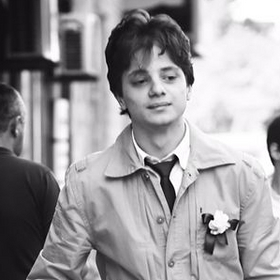Alen Vardanyan – a short life, sacrificed in war
Alen Vardanyan (2001-2020) was one of the most intelligent, friendly and artistic pupils at the Aregnazan Waldorf School in Yerevan. He had an incredible sensitivity for poetry, art and history. Everything was interesting for him. In the 7th grade he listened to Ara Atayan's teaching about Russian poetry. All of the students were given a collection of poems to read by Pushkin, Lermontov, Visocky and other Russian poets. The pupils had to learn the poems by heart; each pupil was asked to learn a poem that was particularly dear to him. And the class then learn them by heart. In the end, all pupils knew all the poems by heart.
Ara Atayan drew a large table with the students' names on a vertical line and the beginnings of the poems on a horizontal line. If someone knew a poem by heart, a line was drawn with a star, if someone knew it very well, a shining star. When Alen Vardanyan spoke, the system had to be changed and a new category created: absolutely beautiful. The way he recited the poem was fresh, with a special quality. Not an imitation of the teacher’s style and not a traditional recitation, it was a narrative entirely drawn from his personality. He was beautiful like a knight with an absolutely peaceful character. Ara Atayan said: Alen resembled Gawain from Arthur’s table.
He lived with his mother and his 16-year-old sister in Yerevan and finished the Aregnazan Waldorf School in 2019. Like all 18-year-old young men, he was drafted directly into the army. And in the first week of October, the first week of the war in the conflict over Nagorno-Karabakh, he died. This senseless war between Azerbaijan and Armenia over a small mountain area, a conflict that has been going on for more than a century and has turned, repeatedly, into warfare, demands - like all wars - senseless life, young life, a life of promise, not yet lived. Alen Vardanyan is one of the faces of this broken promise.
Nana Goebel

